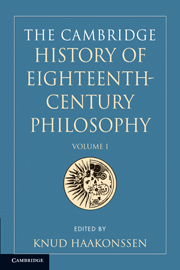Book contents
- Frontmatter
- CONTENTS
- Preface
- Methods of reference and abbreviations
- List of contributors
- I The Concept of Eighteenth-Century Philosophy
- 1 The History of Eighteenth-Century Philosophy: History or Philosophy?
- 2 Concepts of Philosophy
- 3 Schools and Movements
- 4 The Institutionalisation of Philosophy in Continental Europe
- 5 The Curriculum in Britain, Ireland, and the Colonies
- 6 Informal Networks
- II The Science of Human Nature
- Biobibliographical Appendix
- Bibliography
- References
6 - Informal Networks
from I - The Concept of Eighteenth-Century Philosophy
Published online by Cambridge University Press: 28 March 2008
- Frontmatter
- CONTENTS
- Preface
- Methods of reference and abbreviations
- List of contributors
- I The Concept of Eighteenth-Century Philosophy
- 1 The History of Eighteenth-Century Philosophy: History or Philosophy?
- 2 Concepts of Philosophy
- 3 Schools and Movements
- 4 The Institutionalisation of Philosophy in Continental Europe
- 5 The Curriculum in Britain, Ireland, and the Colonies
- 6 Informal Networks
- II The Science of Human Nature
- Biobibliographical Appendix
- Bibliography
- References
Summary
The question of the informal circulation of philosophy in the eighteenth century is one which, by its very nature, is open to debate and surrounded by uncertainty. The subject – of which only the most important aspects can be treated in this survey – takes in private correspondence, groups of thinkers meeting in salons or other informal groupings, and the more or less clandestine networks distributing prohibited works, which often overlapped with journalistic circles. Journals were of course important throughout the century in informing readers of the main content of works, including those expressing heterodox ideas, often through the technique of apparent criticism. They were to some extent the visible expression of the Republic of Letters, supported by information networks which depended on personal contacts. Although the circles I am referring to generally avoided politically dangerous topics, any questioning of established religious doctrines was inevitably seen as dangerous for society. Such ideas therefore circulated in underground networks. Information is consequently difficult to come by and is frequently misleading or open to misinterpretation, and although recent research has started to uncover much new knowledge, large areas of darkness remain. These networks, however, clearly constituted an important channel for the circulation of ideas and information, particularly concerning heterodox thinkers or discussions of theories which cast doubt on religious doctrines.
- Type
- Chapter
- Information
- The Cambridge History of Eighteenth-Century Philosophy , pp. 121 - 136Publisher: Cambridge University PressPrint publication year: 2006



